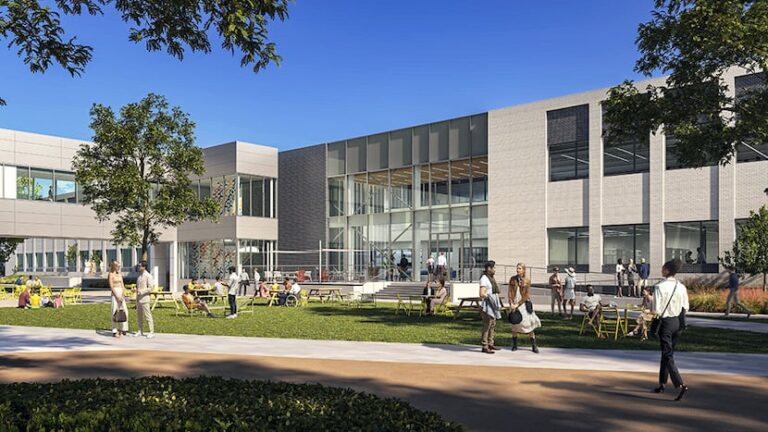Construction crews are nearing completion on the next phase of the Pegasus Park project northwest of downtown Dallas.
The 26-acre life sciences campus on Stemmons Freeway near Love Field has been in the works for more than three years. J. Small Investments is partnering with Lyda Hill Philanthropies to redevelop the commercial complex, which includes an 18-story central tower.
Construction firm Swinnerton is building the next phase of Pegasus Park, a 135,000-square-foot research and development building called Bridge Lab. Montgomery Street Partners is a partner in this project.
Contractors are expected to complete the building structure next month and complete the space in mid-2024. The new building at 3020 Pegasus Park Drive is adjacent to the BioLabs location, which opened in 2020.
The Bridge Labs development includes the demolition of one building on campus and the construction of two adjacent buildings.
Property Management Advisors and Perkins & Will Architects worked with Swinnerton on the Bridge Labs building.
“Bridge Lab will serve as Dallas' premier life sciences hub and we are proud to develop a space that fosters collaboration and innovation,” Montgomery Street's Grant Giuda said in a statement.
The Pegasus Park building once housed the offices of Zeal Corporation and Mobil Oil Company. J Small Investments purchased the land from him in 2015 and redevelopment began.
“The impact Pegasus Park will have on the Dallas region cannot be overstated,” Tyler Whittaker, vice president and division manager of Swinerton's Dallas office, said in a statement.
Pegasus Park is being promoted by a coalition of Texas cities as a potential site for a new federal biomedical research facility. For more than a year, science advocacy groups have been convincing lawmakers that Texas is a good candidate for the Biden administration's $2.5 billion Health Advanced Research Projects Agency, aimed at accelerating discoveries in biomedical health and technology. A targeted campaign has been launched to persuade them.
Dallas leaders worked with Austin and San Antonio to acquire one of three coveted ARPA-H sites. One will take place in Washington, D.C., and the remaining two will be announced this fall.
The battle for the ARPA-H hub will likely be competitive, with delegations from Dallas, Austin and San Antonio likely competing against bids from biotech hubs such as California's Silicon Valley and North Carolina's Research Triangle. A Houston coalition led by the Texas Medical Center is also vying for number one.

